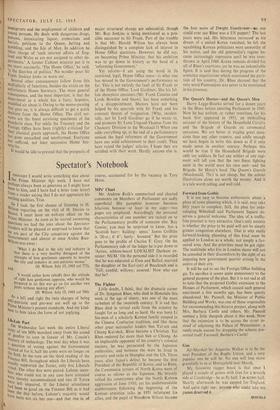The Fighter Little doubt, I think, that the dramatic career
of Dr. Syngman Rhee, who died in Honolulu this week at the age of ninety, was one of the most turbulent of the twentieth century. It is sad that Rhee died in virtual exile from the country he fought for so long and so hard. He was born Li Sin-man of a scholarly Korean family steeped in the Chinese Confucian tradition, and like those other great nationalist leaders Sun Yat-sen and Chiang Kai-shek, Rhee became a Christian. Yet Rhee endured far more than Sun or Chiang. As an implacable opponent of his country's colonial matters, he was persecuted by the Japanese authorities; and between the wars he lived in poverty and exile in Shanghai and the US. Three years after Japan's defeat he became the first President of the Republic of Korea, and to Rhee, the Communist tyrants of North Korea were of course as odious as the Japanese. He bravely rallied his countrymen after the North Korean aggression of June 1950; yet his understandable stubbornness following the beginning of the Korean armistice talks in 1951 infuriated his allies, and the pupil of Woodrow Wilson became the bete noire of Dwight Eisenhower—no one could ever say Rhee was a US puppet! The last years were sad. His bitterness increased as his dream of a united Korea vanished; he felt the squabbling Korean politicians were unworthy of his notice, and the old paternalist's regime be- came increasingly repressive until he was over- thrown in April 1960. Korea remains divided for all of Rhee's exertions; yet he was an indomitable figure. It is said that during the progress of the armistice negotiations which sanctioned the parti- tion of his country, Dr. Rhee decreed that the very word Panmunjom was never to be mentioned in his presence.














































 Previous page
Previous page